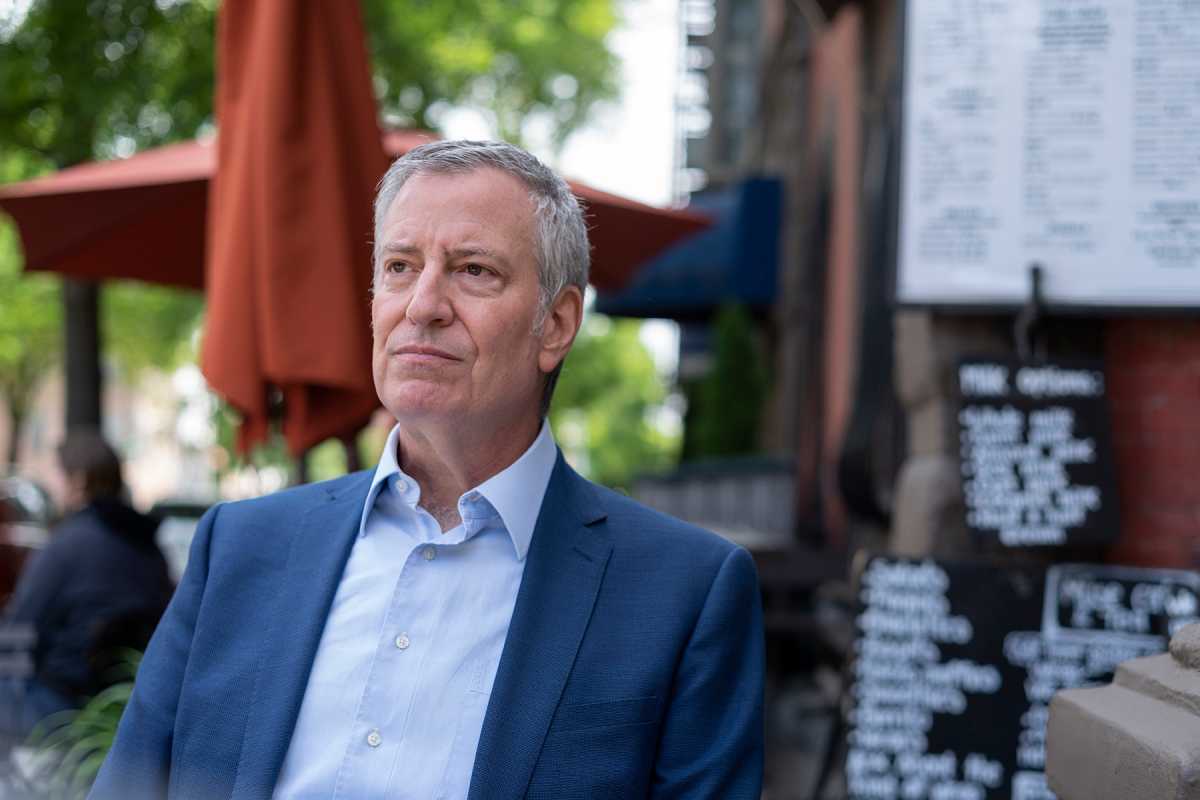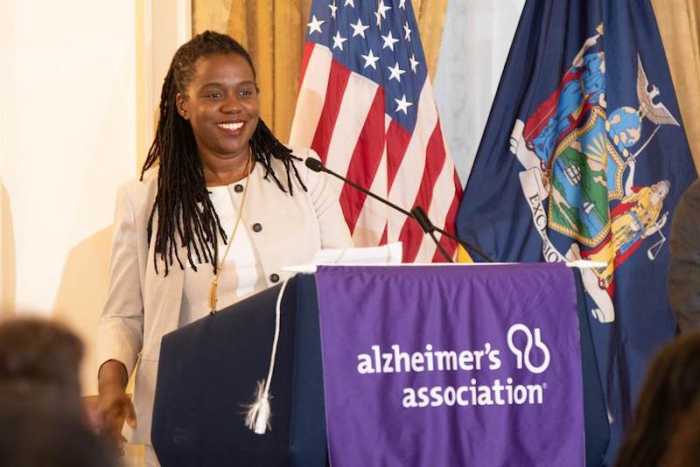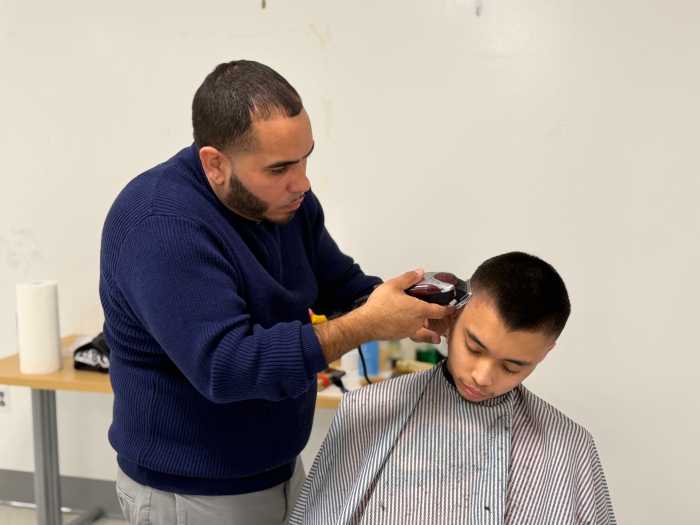Like the excellent retail politician that he is, former Mayor Bill de Blasio remembers names, shakes a good hand using eye contact and is personable in one-on-one conversations.
My professional relationship with de Blasio goes back more than 20 years as I covered him since his first race for the city council in 2001 and on subsequent issues concerning Brooklyn in the City Council, and on citywide issues when he became public advocate and then mayor.
He is now running for the newly revamped 10th Congressional District, which includes all of Manhattan south of 14th Street and the northern white Brownstone belt of Brooklyn with pieces of more Hispanic Sunset Park and Red Hook, and the orthodox Jewish neighborhood of Borough Park.
The following condensed and edited interview took place at the Muse Cafe within walking distance to de Blasio’s home in Park Slope, Brooklyn.
PoliticsNY: You’ve run for president, and toyed with the idea of running for governor with neither of these attempts working out. In this race however, the newly drawn 10th Congressional district lines appear made to order for you as it encompasses your old political base. Can you comment on that?
Bill de Blasio (BDB): I think there’s a lot of truth in that and I was shocked when I saw the map. When it [the map] opened up it happened to show the Brooklyn piece first. I literally said that was my council district. It was like exactly the world that I came from. Right down to the combination of brownstone Brooklyn and Borough Park. What it ended up being interestingly is a hybrid of my council district and my school board district school. District 15 did not go as far into Borough Park but did get into Red Hook and Sunset Park. The school board was the first thing I was elected to in 1999 so I spent a lot of time in those communities and PTA meetings, whatever it was.
PoliticsNY: I remember when I covered you as a city council member you bucked a lot of progressive thinking in supporting both Brooklyn Bridge Park, which drew a lot of opposition because it also included some luxury housing and hotels, and the Atlantic Yards Project. Can you talk about them?
BDB: Thank you for remembering and I feel really vindicated on both those things. Back then it was clear if Brooklyn Bridge Park was not self-sustained it was never going to happen because people forget how bad things were. It would never be kept up the way it is right now. Which is a part of his magic. A lot of people in Brooklyn Heights are proud of Brooklyn Bridge Park. Remember, we wanted to have an egalitarian Brooklyn Bridge Park. We wanted to make sure it was not a secluded enclave. The funding was to create something in terms of sport in a field and basketball courts, everything that everyone wants to use, and that’s what ended up happening.
And on Atlantic Yards, I’m not happy that the affordable housing didn’t work the way we hoped, but the Barclays Center has been unbelievable. It has caused much less disruption to the community than was rumored. You drive by there on a game night and you don’t even know what is happening. In terms of affordable housing, it’s not what I wanted. I wanted more and I think [former governor George] Pataki really undermined that. He should have done much more on affordable housing but he was never going to be that kind of guy. But I appreciate you raising these examples because in the scheme of things, they were the right way to go.
PoliticsNY: Despite the controversy you took on where the money went for ThriveNY, your mayoral administration deserves some credit for highlighting the importance of mental health being part of overall health. I mention this because mental health is often cited as a motive behind mass shootings such as in the recent Texas elementary school shooting. Would that be one of things you would work on if elected to Congress?
BDB: Mental health is one of the things I would work on for sure in Congress. There’s got to be absolute parity in mental health and physical health in our healthcare system. And when I say parity, I don’t mean the exact same number of dollars. For generations, mental health has been the stepchild. It’s been the place we don’t talk about, we don’t invest in, we don’t focus on and yet one in five Americans has some kind of mental health challenge. If there was anything else that affected 20% of people, there’s going to be a huge strategy and investment to work on it, but there’s literally no National Mental Health Strategy.
Mental health has been one of the areas where there is a possibility of bipartisanship response. Chirlane [de Blasio’s wife] has spent a lot of time on Capitol Hill talking to senators and congressmen on both sides of the aisle. The reason many Republicans are receptive to mental health, besides the pervasive reality in their districts, is many were open about having a family dynamic, right. Where they experienced it through family members. I think that common humanity – there’s no family not affected by some mental health issues.

PoliticsNY: There has been speculation in the media that Speaker Nancy Pelosi will back Rep. Mondaire Jones for this seat, in part because he gave up his seat for DNCC Rep. Patrick Maloney to run there, and in part because it’s not a good look for Democrats nationally to have two far left progressives in Alexandria Ocasio-Cortez and yourself. How important do you think it is for the Democrats to move to the center?
BDB: I don’t know anything about the rumors you’re referring to. I have a great relationship with Speaker Pelosi. I’ve worked very closely with her during COVID. I think the world of her. I don’t know what mainstream national Democrats are going to do. I think they have nothing to worry about in this district. They should be focused on winning for Democrats in competitive districts. But you know, my origins. I was never the mainstream Democratic candidate. I was never the choice of the Democratic Party machinery even as recently as 2014 in the mayoral election. I don’t assume that’s how you win elections anyway. So I’m liberated because that’s just in my mind thinking.
I think very highly of Alexandria. I’ve worked closely with her and we have a very nice bond. I don’t agree with her on everything, but I’m very impressed by the work she’s done in Congress and the House with the Progressive Caucus. I think they are principled progressives who also focus on tangible results. That’s where I want to be and I do not worry about what happens in the short term in the sense that I still think Democrats will win in November because I think extremism in the Republican Party is growing by the day and I think it’s going to turn off moderates and independents.









